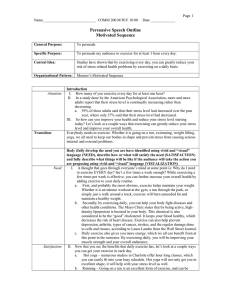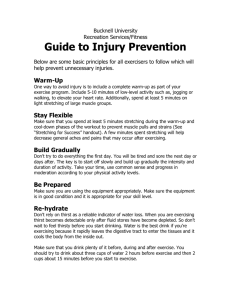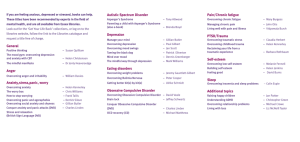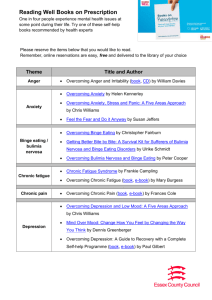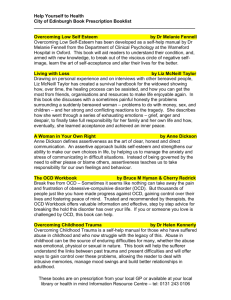G-1321 Exercise, Spring Is the Perfect Time to Start a
advertisement
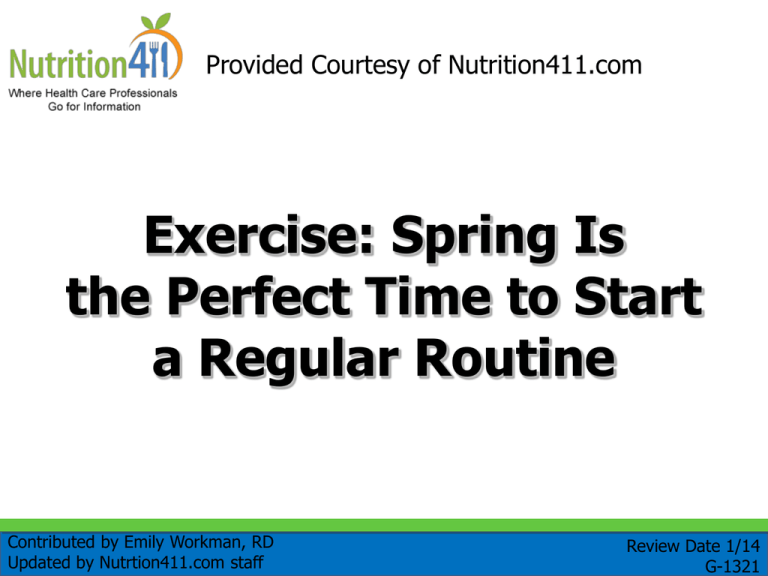
Provided Courtesy of Nutrition411.com Exercise: Spring Is the Perfect Time to Start a Regular Routine Contributed by Emily Workman, RD Updated by Nutrtion411.com staff Review Date 1/14 G-1321 It’s Time to SPRING Into Action! Spring Into Action • Springtime is the perfect time to start an exercise routine! • The weather is warming up, but it is not too hot yet! The Benefits of Exercise • Regular exercise can: – – – – – – – – – Lower blood pressure Decrease heart disease risks Improve energy and mood Help with digestion Improve blood sugar control Control weight Strengthen muscles and bones Lower stress Help you sleep better Overcoming Challenges • Start slowly: – Always check with your doctor before starting an exercise program – Always stretch before and after exercise • Make realistic goals: – Make your goals reachable and doable – Build from these goals Overcoming Challenges (cont’d) • Schedule exercise as you would other appointments: – Make exercise a priority—you are the priority in your life – Remember that making small changes now can increase both the quantity and quality of your life Overcoming Challenges (cont’d) • Exercise with someone: – Ask a friend or family member to help you exercise or have someone exercise with you – Seek encouragement to keep yourself motivated and on track – Have more fun by exercising with someone Overcoming Challenges (cont’d) • Include a variety of activities: – Choose different things to do to keep from getting bored with the same routine – Consider walking, bicycling, dancing, joining a water aerobics class, using exercise videos, doing yard work, stretching, or trying chair exercises What Works for You? • Choose an activity that works for you: – An activity that you enjoy – An activity that your body can handle physically Exercise Ideas • Walking around your house, your neighborhood, or the mall • Stretching, tai chi, or yoga • Working around the house—gardening, vacuuming, washing the car by hand, etc • Joining an exercise class—water aerobics, yoga, dance aerobics, etc • Participating in a sport—tennis, golf, bowling, swimming, bicycling, dancing, etc • Doing chair exercises Experts Recommend • 30 minutes of activity every day • Remember: – Check with your doctor before starting an exercise program – Gradually build up to 30 minutes/day to keep from getting injured, too tired, or overwhelmed – Split up your activity during the day – For example, exercise for 15 minutes when you wake up and 15 minutes before you go to bed Exercise and Diabetes • If you have diabetes, it is important to exercise safely: Check your blood sugar before and after exercise Carry a convenient source of carbohydrate with you Wear diabetes identification Stop exercising if you are light-headed, feel dizzy, have pain, or experience shortness of breath – Wear proper shoes – Drink plenty of fluids – Avoid exercising in extreme weather conditions – – – – Reference • US Dept of Health & Human Services. 2008 Physical Activity Guidelines for Americans. Health.gov Web site. http://www.health.gov/paguidelines/guidelines/d efault.aspx. Accessed January 10, 2014.

